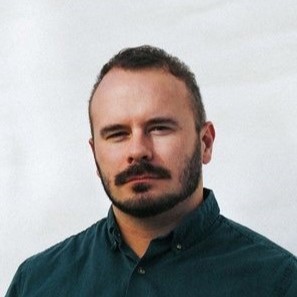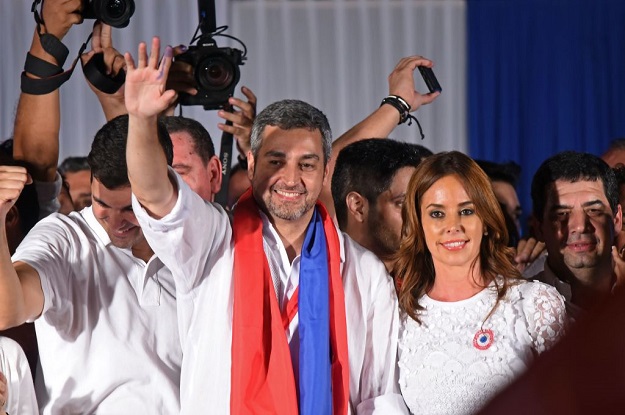This piece has been updated.
ASUNCIÓN – Latin America has (another) new president. Some 2.6 million Paraguayans cast their votes on April 22, electing frontrunner Mario Abdo Benítez, 46, a senator from a traditionalist sector of the governing Colorado Party. As many anticipated, Abdo Benítez defeated Efraín Alegre, 55, of GANAR, a coalition between the conservative Liberal Party (PLRA), the left-wing Guasú Front and other small parties.
Still, the overall results, which included votes for congress, regional governors, regional councilors and Parlasur representatives, were not entirely free of surprises – with big implications for the next five years. Here are five main conclusions from Paraguay’s seventh election since its return to democracy in 1989.
The Colorados hold on to power – barely
The Colorados clinched their sixth election victory in 30 years, meaning that – by 2023 – this big-tent conservative party will have held the reins of power for all but five of the past 33 years (or 85 years, if you count from 1948, including the 1954-89 dictatorship of Alfredo Stroessner).
But the family link between “Marito” and the Stroessner era – he’s the son of Stroessner’s private secretary – probably didn’t hurt his prospects among swing voters. Many older Paraguayans remember Stroessner fondly, and the 60 percent of the population born since 1989 barely remembers him at all. Abdo Benítez’s family link to the dictatorship didn’t set off any alarms for Mariano Galeano, 18, an undecided first-time voter with PLRA-voting parents in Coronel Ovideo, southeast Paraguay. Instead, he told AQ, “I’m worried about crime and insecurity. We need to enforce the law.”
Abdo Benítez also benefited from the infamous abrazo republicano – the ability of the Colorado Party to present a united front in time for elections. Santiago Peña, a technocratic former finance minister who was current president Horacio Cartes’ preferred successor lost to Abdo Benítez in a bitterly-fought primary in December. But he has paraded his loyalty throughout the campaign.
This has allowed Marito to simultaneously present himself as a successor to Cartes, and a departure from Cartes’ unpopular attempt to seek re-election and his heavy reliance on public debt to fund spending.
“Never again should we lose an election,” Peña told an adoring crowd at a Colorado rally a few weeks before the vote. He was the first up on stage to embrace Abdo Benítez at his victory rally on Sunday.
But the Colorados’ opponents are more skeptical of the party’s hegemony. Abdo Benítez, with 46.4 percent of the vote, beat Alegre by just 3.7 percent, the lowest margin since the 1989 transition.
“I think it’s the last election they’ll win,” said Eduardo Nakayama, a PLRA leader. “I think the fall of the Colorado Party is irreversible.”
Unity was key
“The Colorado Party ran a very successful campaign in many ways,” said Claudia Pompa, a political analyst. As ever, strong rural and public-sector party cadres ferried the faithful and ambivalent alike to the polls, even as some voters now demand air-conditioned 4x4s rather than rickety buses. Traditional regional caudillos and their clans play an “increasingly politically important role,” said Andrew Nickson, an expert in Paraguayan history and politics at the University of Birmingham.
Meanwhile, internal divisions didn’t help GANAR – both within the PLRA and between the PLRA and the Guasú Front, which even fought each other for seats in Congress. GANAR also didn’t unveil its ad hoc policy platform of judicial reform, tax hikes and tariff cuts until days before the election. The result? The Colorados ended up capturing 13 out of Paraguay’s 17 departmental governorships – including the pivotal Central department, under opposition control for 30 years.
No more trusting the polls
Paraguay’s pollsters almost all gave Abdo Benítez a lead of 10 to 25 points – a far cry from the actual results.
“They wanted to create the idea of an irreversible Colorado victory,” said Ignacio González Bozzolasco, a political science professor, pointing to the pollsters own closeness to the governing party.
“Polling companies keep distorting electoral expectations,” Pompa agreed. “Overall, the voter is the big loser.”
The errors may not be a conspiracy, due merely to an urban bias in sampling and a historical phenomenon of “shy” PLRA voters, suggested Nickson. But it seems undoubtable that they had an effect. Turnout was just 61.4 percent, the lowest since Paraguay transitioned to democracy. And while the quantity of blank and spoiled ballots was somewhat less than in 2013, added together they far outstrip the difference between Abdo Benítez and Alegre. If the public had known that the race was closer, it could have sharpened minds.
“Why would I go and vote if the candidate is already going to lose?” asked Nakayama.
It would be a stretch to conclude that Abdo won entirely due to dodgy polling – which probably also worked against him in keeping many complacent Colorados at home. “Marito is definitely going to win,” Perla Vera, a Colorado-leaning café-owner in Coronel Oviedo, told AQ ahead of the vote. “But I’m not going to vote; I’ve got to work. They all only think of themselves, anyway.”
But Paraguay’s media might want to take a leaf out of the Associated Press book from now on – don’t lead with polls as the headline or a story in itself.
Two-party politics as usual may be on its way out
“Participation will continue to fall,” to the detriment of Paraguay’s traditional movements – the Colorado Party and PLRA were each founded in 1887 – said González Bozzolasco. The recent introduction of automatic registration means that the parties no longer work to sign up the growing groundswell of younger voters.
This isn’t the only crack visible in Paraguay’s staid two-party democracy. There were eight third-party candidates for the presidency, even if between them they only mustered 5.65 percent of the vote. And where the real variety is likely to show itself is in congressional races. Electoral authorities are revealing those results throughout Monday.
Analysts expect the Colorados to lose a majority in the Senate, and possibly in Congress outright – with a clutch of new left and right-wing parties joining with the PLRA and Frente Guasú to give Abdo Benítez a headache. “The Colorados will be forced to make alliances to pass key legislation,” Pompa told AQ.
Paraguay “has a quasi-parliamentary system in practice,” noted Nickson, who anticipates “behind-the-scenes jockeying, dealings and payoffs” galore.
Constitutional reform is in the cards for 2019
The resulting tensions needn’t just be destructive, however. Feminist party Kuña Pyrenda and a new indigenous movement, The Plurinational Indigenous Politcal Movement, among others, can force the PLRA and the Colorados to modernize and become more inclusive. Following his own candidacy, “many traditional parties are creating space for other indigenous peoples,” said Gerónimo Ayala, a Mbyá Guaraní architect who hopes to become the first indigenous person to sit in Paraguay’s Senate.
And a constitutional reform assembly is firmly on the agenda in 2019, said González Bozzolasco. This could involve tinkering with or scrapping the detested lista sábana (senate list) system, meaning that even more outsiders could enter in 2023.
“Here in Paraguay we need to negotiate,” Nelson Zamudio, a shop-keeper in Coronel Ovideo, told AQ. “You can’t build anything through fighting.” President-elect Abdo Benítez can expect plenty of negotiation in the years to come.
This piece has been updated to include the name of Alegre’s coalition.
—
Blair is a freelance journalist based between London and Latin America.









